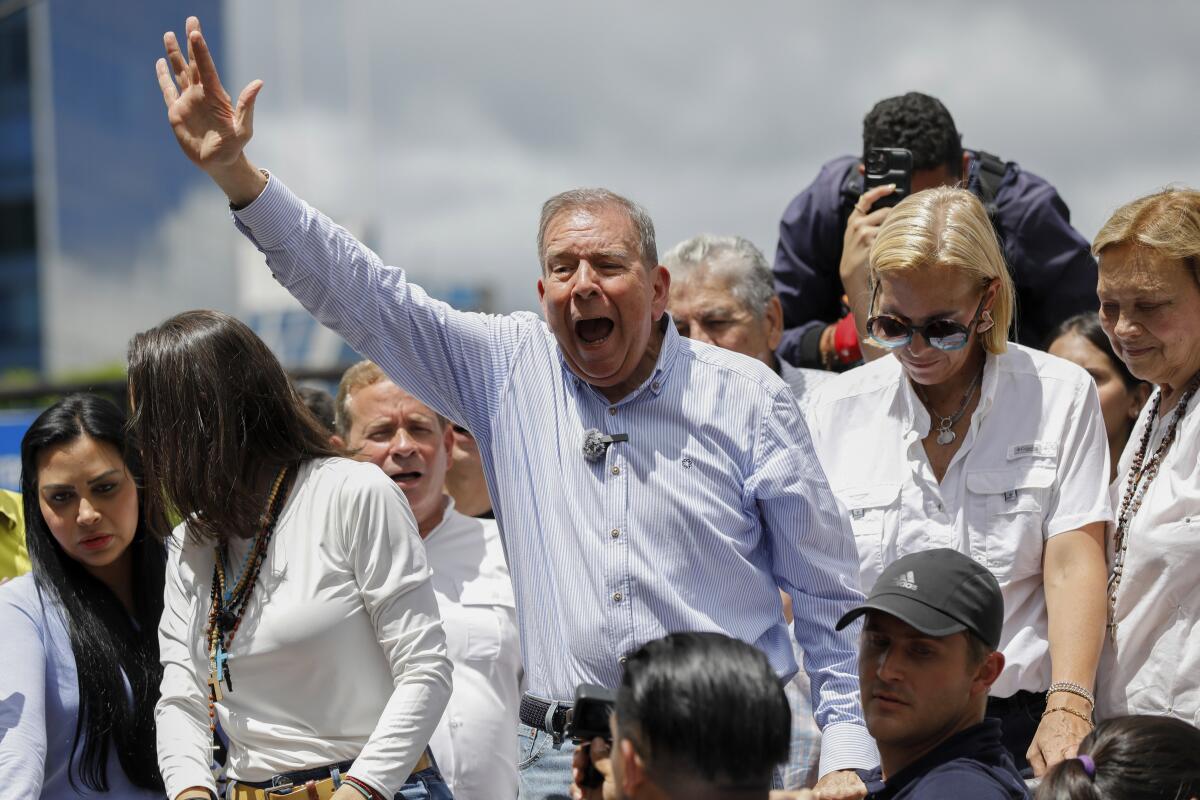Venezuelan judge issues arrest warrant for opposition’s former presidential candidate

- Share via
CARACAS, Venezuela — A Venezuelan judge on Monday issued an arrest warrant for the opposition’s former presidential candidate Edmundo González as part of a criminal investigation into the results of the disputed July election.
The warrant was issued at the request of authorities who accuse González, a former diplomat, of various charges including conspiracy, falsifying documents and usurpation of powers.
The move comes just over a month after election officials declared President Nicolás Maduro the winner of the disputed election that his opponents say he lost.
Ruling party-loyal electoral authorities declared Maduro the victor of the July 28 presidential elections hours after polls closed. They did not show any detailed results to back up their claim as they had offered in previous presidential elections. The lack of transparency has drawn widespread international condemnation.
The opposition, however, managed to obtain more than 80% of vote tally sheets, which are printed by every electronic voting machine, and said they show Maduro lost by a wide margin against González.
In tricky strategy, U.S. says Venezuelan dictator Nicolas Maduro lost election but isn’t recognizing his opponent as the new president.
The ex-diplomat became the opposition candidate after the woman who won the primaries of the main opposition coalition was banned by authorities from running.
Authorities sought the warrant after González failed to appear three times to answer questions from prosecutors in a criminal investigation stemming from the disputed election results.
González was summoned to the prosecutor’s office as recently as Friday. Atty. Gen. Tarek William Saab opened the investigation against González after he and opposition leader María Corina Machado revealed what they said were the results shown in the tally sheets and published them online.
Maduro’s ruling party and the National Electoral Council have refused to publish their copies of tally sheets that the electronic voting machines printed after polls closed.
Instead, as international pressure mounts to release a breakdown of results, Maduro asked the country’s high court to audit the electoral process. The Supreme Tribunal of Justice, stacked with Maduro loyalists, concluded on Aug. 22 that the vote counts published by the opposition were false and certified Maduro’s victory.
González, 75, has not made any public appearances since the day after the election. His campaign did not immediately respond to a request for comment from the Associated Press.
González has questioned the prosecutors’ actions for lack of due process guarantees and accused Saab, a longtime Maduro ally, of being a “political accuser” who “condemns in advance.” He rejected the interview summons arguing, among other issues, that they did not specify the condition under which he was expected to appear.
“They have lost all sense of reality,” Machado, referring to Maduro’s government, wrote on X after the attorney general’s office published the warrant request on Instagram. “By threatening the President Elect, they only manage to unite us more and increase the support of Venezuelans and the world for Edmundo González.”
An AP review of the tally sheets released by the opposition indicates that González won significantly more votes than the government has claimed. The analysis casts serious doubt on the official declaration that Maduro won.
The AP processed almost 24,000 images representing the results from 79% of voting machines, resulting in tabulations of 10.26 million votes. The processed tally sheets also showed González receiving more votes on 20,476 receipts compared with only 3,157 for Maduro.
Garcia Cano and Rueda write for the Associated Press.
More to Read
Sign up for Essential California
The most important California stories and recommendations in your inbox every morning.
You may occasionally receive promotional content from the Los Angeles Times.











